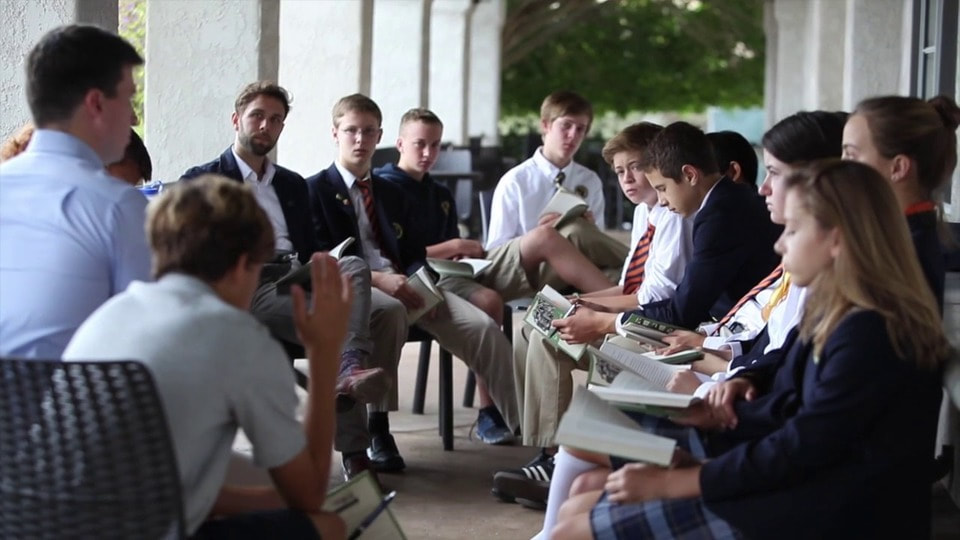The middle/logic school years don’t have to be a daunting, dreaded, peer pressure filled time in students’ lives. As adults, we far too often hear stories from people’s middle school years that have negatively affected them long into their adulthood. We’ve all heard the stories and, in response, many have declared middle school is simply the worst idea in human history.
Another category of adults have simply accepted this as a “fact of life,” a “rite of passage” of sorts to walk through the middle school years getting banged up and bruised.
The middle school years are undoubtably a unique time in students’ lives. It has its own set of challenges unlike any other developmental stage. It’s true that students are walking into a time in their lives where they want to test their wings, formulate their identity apart from their family unit, gain acceptance from a peer group, and also test out their own arguments, thoughts, and opinions. These are normal, natural developmental stages that every middle school age student goes through no matter how hard we may fearfully try to divert them. Walking through those phases is inevitable.
But what doesn’t have to be inevitable is the personal, spiritual, academic, and social pitfalls that mar and bruise our young people while they walk through these stages as they develop into maturity.
What if middle school CAN be different? What if middle school turned into years of incredible growth? What if instead of the stories of negative peer pressure and bruised confidence, your middle school student gained a proper perspective of being part of peer group? What if instead of a drop in a love for school, they nurtured a love for learning and developed long-term motivation, and independence? What if instead of being overbearing with what they think they know, they learned that their thoughts only occupy some of the pool and that everyone has something valuable to bring to the table?
We believe middle school CAN be different!
At The Classical Academy of Fishers, we blend the best of both home influence and classical, Christian, classroom learning. Many families interested in a classical, Christian education understand the home influence part of the family years. The benefits are obvious- more time growing up with siblings, more parental involvement in education and worldview, less overwhelmed family time, less hectic schedule, and more parental guidance of finding good peer groups. The home is central to a student’s development and education.
As students grow and mature, reaching these unique middle school years, we believe the classroom environment becomes even more vital to their learning. The answer, however, is not simply enrolling them in any classroom experience. It doesn’t simply mean drop them into an online “classroom,” or enroll them in the local public school, or just any full-time Christian school.
The KIND of classroom environment matters. And not just in the form of nice kids, or nice teachers, or using the great books. HOW the educational environment utilizes the teacher and engages students is paramount to a truly fruitful middle school education.
The number one thing that is vital to the logic and rhetoric school years is a connection with what the teacher is communicating. Students in the logic years developmentally like to judge, critique, debate, and ask the “why” questions. This means the connection component is crucial to their education. Students must be able to form a connection with, and interact with, what’s being communicated (such as the curriculum, the actual teaching, or even videos). True education and growth takes place within connection and interaction. If you pay really close attention to the traditional middle school classroom, there is little to no interactive dialogue learning in the middle school and high school years.
The two ways this crucial connection and interaction happens is through sympathy and fellowship.
Dr. Chris Schlect, master teacher and classical educator, encourages parents to evaluate the TYPE of middle school environment they are providing for their children. He uses sympathy and fellowship as a framework for evaluating the kind of education your student is receiving.
Sympathy- the vertical relationship between the teacher and students.
Fellowship- the horizontal relationship of a student working together as a cohort, rather than the student learning solo.
Sympathy
Most of us are familiar with the kind of education that is delivered in the style equivalent to a keynote address. The teacher or professional stands in front of the class delivering information. It doesn’t matter if he’s in front of 25 students or 250 students. There is no interaction to cause sympathy, maturation, and development in that environment. Students simply attempt to absorb the information. You could have the nicest group of kids and teachers in this environment, but it doesn’t mean students are actually developing and learning in the most effective way.
In the classical, Christian school, our logic program embodies sympathy and looks like the Oxford model- a few students in a professors office where there is a deep oral engagement of the material. Why is this connection and interaction, or sympathy, vital to the process? The professor needs to be able read the students understanding of material, which means the students need to produce their understanding of the material and not just parrot back.
The students need to see the instructor adjusting and making meaningful adaptations to the material to meet the student. He is essentially seeing the material through the students’ eyes. When the students see the instructor doing this, it creates a dynamic that makes all the difference in the world.
Fellowship
Fellowship is the horizontal relationship between students. This is working together as a cohort, rather than the student learning solo. This is an incredibly important piece of the educational experience in logic school because if you go through life solo, having educational experiences solo, you don’t have the traction to help you broaden your own experience beyond your own experience. This is vital to the middle schools years! No matter how much we believe differently than one of our peers or teachers, we teach our students that their perspective only occupies some of the pool, not all of it. This teaches students to listen sincerely, to respect others, to practice cooperation, to seek out personal growth, and to learn about someone else, rather than just fighting to always be “right.”
When we give our student an environment where they can see another student’s learning process, they end up with a whole lot more experience than just their own solo experience. This means students need to be able to see the lesson through one another’s eyes, just as the teacher, in sympathy, needs to see the lesson through the students’ eyes. The students’ creative work in manifesting their understanding is important both for sympathy and fellowship- between student and student, and between teacher and students.
Sympathy combined with fellowship=mind on mind engagement.
The teacher gets the conversation directed, steps back a little, and lets their minds do the work. The goal is for students to utilize the text/curriculum, along with their cohorts, to produce their understanding of the material and not just parrot back the information. The one who does the thinking, does the learning. The collaborative momentum of this environment is incredibly rich. It is wisely guided and directed by the teacher in such a way that students are not being led to create their own versions of truth, but rather, they are taught to analyze, to discuss, and to use God’s Spirit to hold all things in light of Scripture.
The entire logic school (7th-8th) and rhetoric school (9th-12th) of classical education looks very different than traditional middle and high school classrooms. When you walk the hallways, you find classroom of tables and teams of students doing much of the talking and discussing under the guidance of teachers. Students reading Homer? Absolutely. But they aren’t just reading Homer, answering test questions about the book, and giving a personal essay.
When students read Homer, they come back to class and the understanding of Homer gets presented, interacted, and bantered with, all in the context of sympathy and fellowship. This is where Homer becomes valuable.
Can students work through Homer in an online video course, or in a traditional classroom where they answer multiple choice questions and write essays without ever testing their own personal thought process? Yes, they can “complete” that schoolwork. But, have they grown and learned? Education becomes alive when students have to do something with it, under the tutelage of the instructor, and within the context of the fellowship of the cohort.
The Classical Academy Logic School is a markedly different approach to the middle school years than traditional education practices. We honor the family and maintain its primary influence and guidance. We give students the gift of time, and we provide the high quality pieces of the academic experience that are difficult to reproduce in a homeschool only setting.
Do you feel that providing sympathy and fellowship is nearly impossible in a home education only setting? Or, is your student a full-time public or private school student and they are missing out on connecting and interacting in their learning environment? Come join us at Fishers classical, Christian, collaborative school.


